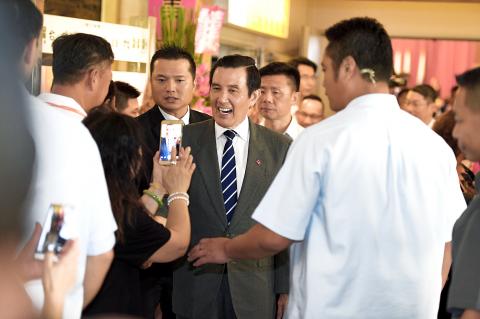The Taiwan High Court yesterday upheld a lower court ruling acquitting former president Ma Ying-jeou (馬英九) of abetting a leak of classified information related to an investigation into an opposition lawmaker in 2013.
The High Court’s ruling is final and cannot be appealed.
Presiding judge Chou Cheng-ta (周政達) said that Democratic Progressive Party caucus whip Ker Chien-ming (柯建銘), who had accused Ma of leaking state secrets, failed to present sufficient evidence to prove Ma’s guilt.

Photo: George Tsorng, Taipei Times
Ma’s office spokeswoman Hsu Chiao-hsin (徐巧芯) later told a news conference that Ma was grateful for the ruling.
When asked for comments, Ma only nodded and smiled to reporters.
Neither Ma nor Ker were present in the courtroom to hear the verdict.
The case dates back to September 2013, when it was revealed that then-state prosecutor-general Huang Shyh-ming (黃世銘) had shown Ma a transcript of wiretapped conversations that were part of evidence collected in an ongoing investigation of an alleged breach of trust by Ker.
In the taped conversations, then-legislative speaker Wang Jin-pyng (王金平) and Ker were heard talking about lobbying two senior Ministry of Justice officials, including the minister of justice, to prevent any appeal of the breach of trust case in which Ker had been acquitted.
Prosecutors said that Ma encouraged Huang to leak the contents of the recording, Ker’s personal information and other information related to the ongoing investigation to then-premier Jiang Yi-huah (江宜樺) and then-Presidential Office deputy secretary-general Lo Chih-chiang (羅智強).
Chou said that the wiretapped conversation failed to present sufficient evidence to prove Ma had instigated Huang to leak the recording, and it was constitutional for Ma, as president, to express concern about the domestic political situation.
The verdict also cited President Tsai Ing-wen’s (蔡英文) management of Cabinet appointments, saying Tsai personally asked Cabinet officials to remain at their posts after the Cabinet resigned en masse last month, suggesting that it is constitutional for a president to step in when Cabinet members are engulfed in a political scandal or involved in illegal activities.
Yesterday’s ruling upheld the Taipei District Court’s Aug. 25 ruling, which found Ma not guilty, saying there was insufficient evidence to prove he had instigated the leak and there was no indication of criminal intent on Ma’s part.
The court also cited Article 44 of the Constitution, saying that as president, Ma had the power to intervene in disputes between different branches of government.
Hsu said the ruling shows that a former president would not have to be bothered by unreasonable accusations like the lawsuit brought by Ker.

A Ministry of Foreign Affairs official yesterday said that a delegation that visited China for an APEC meeting did not receive any kind of treatment that downgraded Taiwan’s sovereignty. Department of International Organizations Director-General Jonathan Sun (孫儉元) said that he and a group of ministry officials visited Shenzhen, China, to attend the APEC Informal Senior Officials’ Meeting last month. The trip went “smoothly and safely” for all Taiwanese delegates, as the Chinese side arranged the trip in accordance with long-standing practices, Sun said at the ministry’s weekly briefing. The Taiwanese group did not encounter any political suppression, he said. Sun made the remarks when

The Taiwanese passport ranked 33rd in a global listing of passports by convenience this month, rising three places from last month’s ranking, but matching its position in January last year. The Henley Passport Index, an international ranking of passports by the number of designations its holder can travel to without a visa, showed that the Taiwan passport enables holders to travel to 139 countries and territories without a visa. Singapore’s passport was ranked the most powerful with visa-free access to 192 destinations out of 227, according to the index published on Tuesday by UK-based migration investment consultancy firm Henley and Partners. Japan’s and

BROAD AGREEMENT: The two are nearing a trade deal to reduce Taiwan’s tariff to 15% and a commitment for TSMC to build five more fabs, a ‘New York Times’ report said Taiwan and the US have reached a broad consensus on a trade deal, the Executive Yuan’s Office of Trade Negotiations said yesterday, after a report said that Washington is set to reduce Taiwan’s tariff rate to 15 percent. The New York Times on Monday reported that the two nations are nearing a trade deal to reduce Taiwan’s tariff rate to 15 percent and commit Taiwan Semiconductor Manufacturing Co (TSMC, 台積電) to building at least five more facilities in the US. “The agreement, which has been under negotiation for months, is being legally scrubbed and could be announced this month,” the paper said,

MIXED SOURCING: While Taiwan is expanding domestic production, it also sources munitions overseas, as some, like M855 rounds, are cheaper than locally made ones Taiwan and the US plan to jointly produce 155mm artillery shells, as the munition is in high demand due to the Ukraine-Russia war and should be useful in Taiwan’s self-defense, Armaments Bureau Director-General Lieutenant General Lin Wen-hsiang (林文祥) told lawmakers in Taipei yesterday. Lin was responding to questions about Taiwan’s partnership with allies in producing munitions at a meeting of the legislature’s Foreign Affairs and National Defense Committee. Given the intense demand for 155mm artillery shells in Ukraine’s defense against the Russian invasion, and in light of Taiwan’s own defensive needs, Taipei and Washington plan to jointly produce 155mm shells, said Lin,